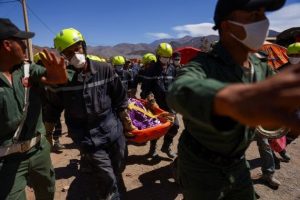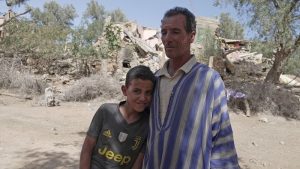• The death toll has reached at least 2,901,
•Medics and rescuers continue to fight the clock as hopes fade of finding more survivors under the rubble.
• At least 100,000 children have been impacted by the earthquake, the United Nations says.
• Qatar, Spain, the United Arab Emirates and the United Kingdom are the countries participating in search and rescue operations.
Morocco quake toll likely to rise with rescuers yet to reach some remote villages
Hopes of finding survivors under the rubble are fading, not least because many of the traditional mud brick houses that are common in mountain villages crumbled to earthen rubble without leaving air pockets.
Some survivors have camped out in the open along the Tizi n’Test road, which connects remote valleys to Marrakesh. They salvaged what they could from the wreckage, quickly packed bundles of their belongings and fled their destroyed villages.
“The authorities are focusing on the bigger communities and not the remote villages that are worst affected,” Hamid Ait Bouyali, 40, said as he waited on the roadside. “There are some villages that still have the dead buried under the rubble.”
Many villagers have had no power or telephone service since the earthquake struck and said they had to rescue loved ones and pull out bodies buried under their crushed homes without any help.
(11:47 GMT) Collective aspect of village life could be affected by earthquake
Abdel Aouragh, a driver, told Al Jazeera he fears the earthquake will change life in the mountain villages even more than it has in the past years.
In the past, he said, people would work either in farming or guiding tourists on picturesque treks through the mountains.
But recently, social media, modernity and social mobility have emptied the villages to the point where only elderly people and children are left in the winter.
Now, he argues, more people will move to Marrakesh, forsaking the villages, and new building regulations will change the traditional way of life.

(11:21 GMT) People still trapped, in need of basic necessities, activist says
Errachid Montassir, an activist and humanitarian worker, has been travelling with doctors to remote villages in the Atlas Mountains.
It took them five hours to reach the town of Ijjoukak because the road was blocked, Montassir told Al Jazeera.
“It was a disaster and also a shock to see people still under the ground there,” he said. “The army is doing [its] job to bring these people out of the ground, but also it’s very, very difficult to reach these places, so you can imagine that there is no food but also there’s no blankets or beds where people can sleep.”
The government is setting up medical camps as close as it can to the villages, he explained, but access for residents is very difficult.
“There’s some materials that you can bring with you up to the mountains, and sometimes we use mules to bring this, but it is really not enough,” Montassir said.
Morocco earthquake: ‘I had to choose between saving my parents or my son’
Tayeb ait Ighenbaz was forced to choose whether to save his 11-year-old son or his parents when they became trapped under rubble after Morocco’s earthquake struck.

The goat herder from a tiny community in the Atlas Mountains told BBC he is haunted by the decision he had to make.
Tayeb was with his wife, two children and parents on Friday night in their small stone home when it was rocked by the country’s biggest earthquake in 60 years.
He leads me to his former home, which now lies in ruins.
You can still see partially inside the building and he points at the rubble, saying: “That’s where they were.”
“It all happened so quickly. When the earthquake happened we all ran to the door. My dad was sleeping and I shouted at my mum to come, but she stayed behind to wait for him,” he recalls.
On the other side, he could see only his wife and daughter.
As he made his way back into the fallen building, Tayeb found both his son and his parents trapped under debris. He could see his son’s hand poking through the rubble.
He knew he had to act quickly, and headed in the direction of his son Adam, digging desperately through the rubble to pull him out.
When he turned to his parents, trapped under a large slab of stone, he says it was too late.
“I had to choose between my parents and son,” he says with tears in his eyes.
“I couldn’t help my parents because the wall fell over half of their bodies. It’s so sad. I saw my parents dying.”
Tayeb points down at stains on his light-coloured jeans, saying this is the blood of his parents.
All of his clothes are in his house, and he has been unable to get changed since the earthquake.
The family are now living with relatives in makeshift tents close to their former home. Tayeb says all of his money was in the house and most of his goats have been killed.
“It’s like being born again into a new life. No parents, no house, no food, no clothes,” he says. “I’m 50 years old now and I’m having to start again.”
He can’t begin to think how to move forward, but remembers the lessons that his parents taught him. “They always said ‘be patient, work hard, never give up’.”
As we talk, his son Adam runs over, dressed in a Juventus football kit with Ronaldo’s name on the back, and wraps his arms around his dad.
“My dad saved me from death,” he says grinning up at him.
Just minutes down the road towards the town of Amizmiz, another father and son stand with their arms wrapped around each other.
Abdulmajid ait Jaefer says he was at home with his wife and three children when the earthquake struck and “the floor fell through”.
His son, 12-year-old Mohamed, got out of the building, but the rest of the family were stuck.
Abdulmajid says his legs were trapped under rubble, but he was pulled out by a neighbour. He then spent two hours trying to rescue his wife and one of his daughters. Both were dead when he pulled them from the debris.
The following day, his other daughter’s body was also pulled from the rubble.
Abdulmajid, 47, is now sleeping under tarpaulin across the road from his house.
He can see the kitchen, with the fridge still standing and clothes hanging out to dry.
He says he cannot leave the area because he needs to “stand guard” over his possessions, and the memories of his life there.
“That’s my kitchen and my fridge. We were all in there. Now I’m just looking at it,” he says.
Before Friday, Abdulmajid says he had “never even dreamed about an earthquake. Even now, I can’t believe it.”
As we talk, cars stop next to us and people lean out to offer condolences. Others walking down the street stop to hug the mourning father and husband.
“There were five people in my family. Now there are two,” he tells me sadly.
“For now, I’m thinking of only one thing: my son.”
Sources: Al Jazeera and BBC



